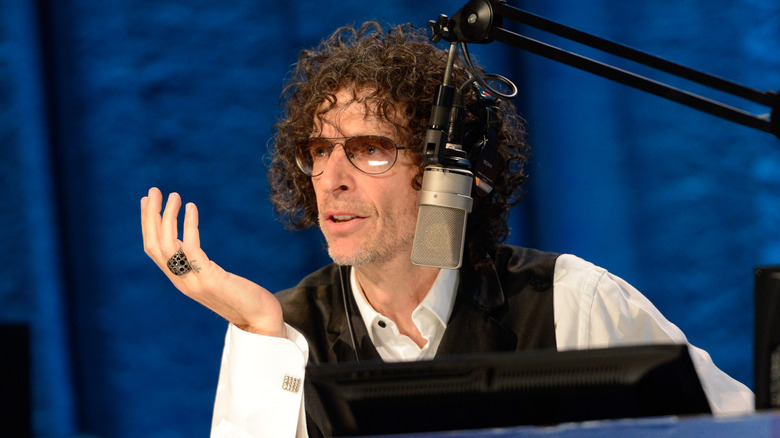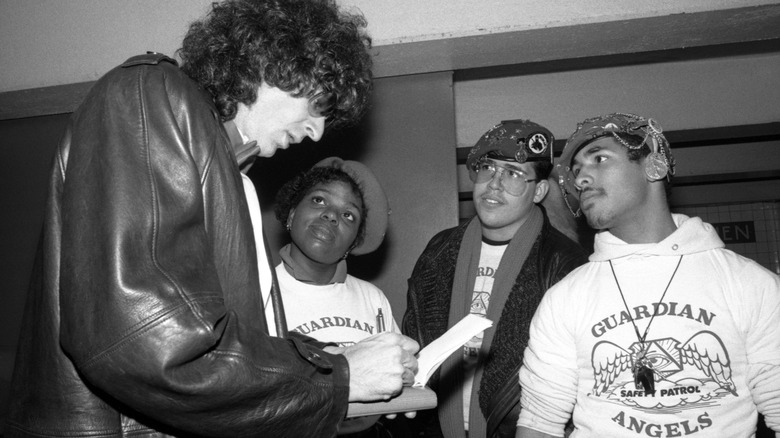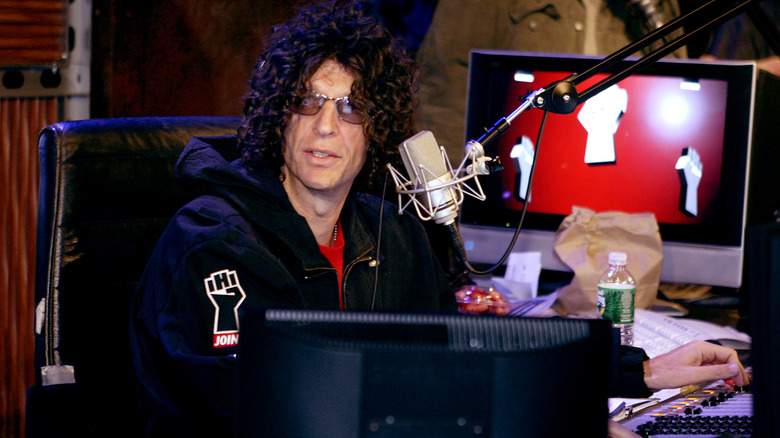Don't Be So Quick To Forget Howard Stern's Problematic History (We Sure Haven't)
Howard Stern swears he has distanced himself from his shock jock past, but we're not ready to forgive and forget the shady chapter of his career.
If you try and listen to any recent episode of "The Howard Stern Show" without a preconceived notion of who Stern was, you'd probably think that he's a phenomenal interviewer with a knack for next-level introspection. And well, he is. He's capable of unmasking celebrities and getting them to show raw emotion and divulge intimate details about themselves that they wouldn't dare share elsewhere. Today, he seems to have perfected the art of psychoanalyzing interviewees without being too intrusive, which makes his shows packed with insight, leaving listeners wanting more.
But this wasn't the case a decade or so ago. Back in the '80s through the early 2000s, many celebrities were repulsed by Stern and wouldn't even think about stepping foot into his studio. "The humor was very aggressive, and I was just scared of that humor," Ellen DeGeneres told The Washington Post of appearing on Stern's show. "I was scared of him and getting hurt by him or slammed by him, and he had massive fans." ViceTV's "Dark Side of the 2000s" serves as a stark reminder that once upon a time, Stern was the antithesis of what a good broadcaster was. And just like how he puts his guests in a trance when he talks to them, he seems to have convinced audiences that he's a changed man when, not too long ago, he was repeatedly getting flagged by the FCC for being one of the most provocative personalities to ever grace the airwaves.
Howard Stern pushed the envelope of what's appropriate to broadcast for ratings
In ViceTV's "Dark Side of the 2000s," Howard Stern's contemptible antics to catapult himself to being the #1 radio jock in America and so-called "king of all media" were magnified, reminding us that maybe he shouldn't be as well revered as he is now. During his reign as a leading radio personality in the '90s, he marketed himself as a Hollywood outsider who hated everyone in the system and wouldn't bat an eyelash slinging insults at whatever he fancied. "I fart on the air," he used to say. Along with his co-hosts, he also had segments for the sole purpose of degrading women, asking them to strip or hop on weighing scales or even flinging meat to their behinds. He didn't care who he offended because he meant to offend.
"The way that I felt that I could get mass audiences and ensure I'd get to work another day was to be the most outlandish, the most wild, the most funny and controversial, like a guy who had just gotten out of an insane asylum," he explained to The New York Times Magazine. "I was unleashing parts of my brain that I probably should've kept quiet, but I felt it was a legitimate way to do radio." His insistence on being the most outrageous and controversial for sustained attention often led him to take things too far. He joked about masturbating to a photo of Aunt Jemima, mocked Selena's death a day before her funeral, and made light of the Columbine High School shooting. He didn't care as long as it earned him listeners, and the most shocking part is that he has no regrets.
Does Howard Stern deserve to get away with it all?
Howard Stern isn't a big fan of rehashing his old work because even he finds his past self outrageous. "I am the poster boy for doing everything offensive. I've done insane things. But everything I did, I make no apologies for, because I was trying to entertain people," he told The New York Times. "But, you know, it's painful for me to look back on my career, because a lot of that stuff I said I don't know how much I believed." He credits therapy for his changed behavior, but what's hard to stomach is barely anyone held him accountable for his on-air transgressions.
For what it's worth, Stern insists that he had done an almost complete 180 and is now lightyears away from the raunchy image he once cultivated. He even did an apology tour and called up people he had maligned. In an interview with NPR, he said, "As I got older and wiser I started to look at that [past work], and I said, well, it troubles me. That's not who I am anymore. ... And a lot of that stuff I can't stand now. It's too harsh. And if I hadn't changed, if I had become a 65-year-old guy fawning over women, it would have been pathetic and sad, and I would have ended up an oldies act. My audience would've aged out with me."
Everyone is capable of changing, and some even deserve redemption, but it's tough to sense even a modicum of authenticity from Stern. He's made it clear that he offers no apologies for what he'd done in the past, but there is also reason to believe that his new changed man persona is merely a schtick to avoid being held accountable. As he's proven time and time again, he is a master in contorting his behavior to what he thinks his listeners want, so today's Stern may not be so different from shock jock Stern of the '90s. If he really wants people to believe that he's changed, the least he can do is hang up the mic.



